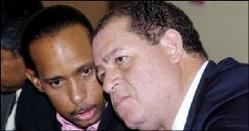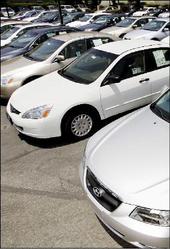John Myers Jr, Business Reporter

Kenneth Shaw (left) president of the Jamaica Used Car Dealers Association, consult with Finance Minister Audley Shaw at the assocaition's annual general meeting, Jamaica Pegasus, November 8, 2007. - File
Government's new motor-tax regime could drive up auto prices on small cars, stoke competition, and put used-car dealers out of business, according to chief spokesman Kenneth Shaw.
Shaw, the president of the Jamaica Used Car Dealers Association (JUCDA), went as far Monday to predict that the sector could fold.
Shaw later told Wednesday Business that the used-car sector's profit margins are about three to four per cent, and that JUCDA, based on its assessment of the new tax structure, anticipates a total erosion of that cushion.
"If this policy is allowed to continue as it's announced, then you won't have a used-car sector anymore," he said, speaking Monday as invited guest at the Rotary Club of St Andrew North's weekly dinner meeting.
Jamaica auto industry comprises 130 used-car dealers and 25 dealers in the new-car sector.
Simplification
Used vehicles account for about 60 per cent or 11,400 of the 19,000 vehicles imported into Jamaica annually, while new car dealers import more than 7,000 vehicles.
Finance Minister Audley Shaw announced a 'simplification' of the motor-tax regime to take effect May 1 - and projected to yield revenues of $985 million - replacing the "plethora of GCT rates" with a new structure under which import duties have been revised within a band of 10 to 70 per cent, depending on the range and type of petroleum-powered vehicle, plus a standard 16.5 per cent GCT.
Diesel vehicles of all types would be charged a 10-per-cent duty and 16.5-per-cent GCT.
Under the old regime, GCT was quoted from a low of 8.08 per cent to a high of 154.55 per cent, Wednesday Business has learned.
"Taxes should have been reduced significantly with the simplification of the whole tax regime. This did not happen, however," said Shaw.
Higher duties
The result, he added, has been a disparity in the impact upon small versus large vehicles, with the former seeing higher duties while the latter's has been reduced.
"They were supposed to tie both of them together, but what they have done is to implement the system in part, the net result being an increase in duties in most cases from about 1.4 per cent to a high of 23.5 per cent on some vehicles, especially the smaller engines."
Citing examples, Shaw said the current duty on a 1000cc Suzuki Swift is 67 per cent, plus the 2.0-per-cent Custom User Fee and 0.5-per-cent environmental levy.
However, he said under the proposed new structure, those duties have increased by 23 per cent.
For a 6000cc V8 Cadillac Escalade, which attracts an 82.5-per-cent duty, the JUCDA president said that has been reduced by about 26 per cent.
"That seems to go contrary to what I think they intended because with a fuel bill reaching US$2 billion, I would have thought they would have given more leeway to the cars with the lower (smaller engines) and put up the duties on the higher (larger engine)," he said.
Individuals and dealers will pay the same rates, but the former will be allowed only one vehicle import per year.
Dynamics of the sector
Shaw, however, believes that this opens up his sector to competition from persons who do not have overheads to finance.
"It would seem somewhat unfair to ask an individual and a dealer to pay the same rates because of the dynamics of the sector," he said.
Dealers, he added, are also likely to face supply challenges, under the new policy restricting the age of imported vehicles, saying three-year-olds and newer cars are "almost nonexistent" in Japan, Singapore, Malaysia and other supply markets.
business@gleanerjm.com


